Herbs have been with us for hundreds – in some cases thousands of years. They have played a role in folk medicine, religion, and cooking. Today many people around the world like to grow their own herbs or buy them to use in recipes. Pets can also benefit from some of the same herbs that are good for humans. Here’s a quick look at some of the pet friendly herbs people use today. You can find out more about each herb by following the links.
Cautions about Herbs for Pets
We have provided a list of herbs that are safe for dogs and cats with some brief information about each one. Both dogs and cats can have these herbs in small amounts with a few exceptions. Oregano is one exception. While oregano is safe for dogs in small amounts, it can be toxic for cats. Allspice and cloves can be toxic to both cats and dogs.
Herbs discussed here refer to using them the same way they are used as an ingredient in human foods. That typically means use of the chopped, fresh leaves or the dried, ground version sold in containers in grocery stories. Some herbs can also be used as a tea. However, there are warnings against giving dogs and cats essential oils made from virtually all herbs because these oils are very concentrated. Many essential oils can be toxic to your pet.
As always, we recommend that you talk to your veterinarian before changing your pet’s diet. Some herbs can have noticeable effects on a dog or cat’s health. Many herbs can affect blood sugar levels and digestion. Some herbs can affect other health issues. Just because they are herbs and seem “natural” doesn’t mean that they can’t pack a punch. You should treat them with caution when giving them to your cat or dog.
Pet Friendly Herbs for Your Dog or Cat
Basil
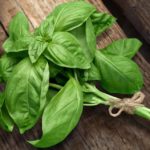 Basil is considered a safe herb for pets. It has a long history of use in human foods. It has also been used in folk medicine as an antibacterial and anti-fungal. It’s even been used as an insect repellent. High in antioxidants, basil is used in both traditional Chinese medicine and Ayurvedic medicine. Basil is high in vitamin K so it can interfere with blood thinners. It can also affect blood sugar levels. If your pet has diabetes or any kind of blood problem or bleeding disorder, talk to your veterinarian before adding basil to their diet.
Basil is considered a safe herb for pets. It has a long history of use in human foods. It has also been used in folk medicine as an antibacterial and anti-fungal. It’s even been used as an insect repellent. High in antioxidants, basil is used in both traditional Chinese medicine and Ayurvedic medicine. Basil is high in vitamin K so it can interfere with blood thinners. It can also affect blood sugar levels. If your pet has diabetes or any kind of blood problem or bleeding disorder, talk to your veterinarian before adding basil to their diet.
Use 1/8 to 1 teaspoon, depending on your pet’s size… more
Cilantro
 Cilantro/coriander is considered to be safe for pets. Cilantro usually refers to the fresh leaves of the plant while coriander refers to the dried seeds. The seeds are considered to be a spice. All parts of the plant are edible and safe. Cilantro is closely related to parsley and sometimes called “Chinese parsley.” Cilantro/coriander has been used to help with minor digestive issues such as gas. For some dogs it seems to act as a stimulant to the appetite. It appears to help reduce anxiety in some dogs and even helps pets sleep better. Cilantro does have a unique flavor so you should introduce it slowly to your pet. Not all pets like it.
Cilantro/coriander is considered to be safe for pets. Cilantro usually refers to the fresh leaves of the plant while coriander refers to the dried seeds. The seeds are considered to be a spice. All parts of the plant are edible and safe. Cilantro is closely related to parsley and sometimes called “Chinese parsley.” Cilantro/coriander has been used to help with minor digestive issues such as gas. For some dogs it seems to act as a stimulant to the appetite. It appears to help reduce anxiety in some dogs and even helps pets sleep better. Cilantro does have a unique flavor so you should introduce it slowly to your pet. Not all pets like it.
Use 1/16 to ¼ of a teaspoon sprinkled on food, depending on your pet’s size… more
Dill
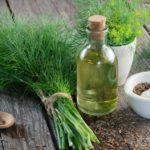 Dill (dill weed and its seeds) have been used for millennia in food, medicine, and even in soaps. In folk medicine, dill has been used to treat digestive problems such as colic in babies and bad breath. Dill is rich in plant compounds and antioxidants. It also has antibacterial and antimicrobial properties. Dill can be an allergen for some people and pets. It is closely related to asafoetida, caraway, celery, coriander, and fennel so if you or your pet are allergic to any of these plants, you could be allergic to dill as well. Dill can also affect thyroid levels so if you or your pet are hypothyroid, use with caution.
Dill (dill weed and its seeds) have been used for millennia in food, medicine, and even in soaps. In folk medicine, dill has been used to treat digestive problems such as colic in babies and bad breath. Dill is rich in plant compounds and antioxidants. It also has antibacterial and antimicrobial properties. Dill can be an allergen for some people and pets. It is closely related to asafoetida, caraway, celery, coriander, and fennel so if you or your pet are allergic to any of these plants, you could be allergic to dill as well. Dill can also affect thyroid levels so if you or your pet are hypothyroid, use with caution.
Use ¼ to 1 teaspoon sprinkled on food, depending on your pet’s size… more
Oregano
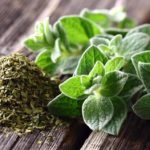 contains a number of antioxidants. As part of herbal medicine, it has been used for a vast array of ailments for centuries. Recent research suggests that it may be effective as an antibacterial, anti-inflammatory, for regulating blood sugar and lipids, and even for fighting cancer. Oregano is safe for most dogs in small amounts. However, it is toxic to cats even in very small amounts.
contains a number of antioxidants. As part of herbal medicine, it has been used for a vast array of ailments for centuries. Recent research suggests that it may be effective as an antibacterial, anti-inflammatory, for regulating blood sugar and lipids, and even for fighting cancer. Oregano is safe for most dogs in small amounts. However, it is toxic to cats even in very small amounts.
Use 1/8 to ½ teaspoon sprinkled on food, depending on your dog’s size. (Not for cats.)… more
Parsley
 In herbal medicine, parsley has been used for improving digestion, for bad breath, kidney stones, to increase urination, for constipation and gastrointestinal problems, for skin problems, and even to stimulate the appetite. Parsley has very high levels of vitamin K, along with flavonoids and antioxidants. Parsley is also very high in oxalates so if your pet has calcium oxalate kidney stones, it’s best to avoid parsley. Most pets should be able to eat parsley in moderation without any problems.
In herbal medicine, parsley has been used for improving digestion, for bad breath, kidney stones, to increase urination, for constipation and gastrointestinal problems, for skin problems, and even to stimulate the appetite. Parsley has very high levels of vitamin K, along with flavonoids and antioxidants. Parsley is also very high in oxalates so if your pet has calcium oxalate kidney stones, it’s best to avoid parsley. Most pets should be able to eat parsley in moderation without any problems.
Use ½ teaspoon per 10 pounds of body weight… more
Peppermint
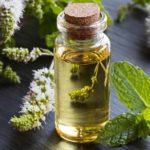 Peppermint is a hybrid mint plant that now grows naturally throughout Europe and the Middle East. Put thoughts of peppermint candy out of your head! This is a plant, not a candy. Leaves from the plant have been used to help with digestive problems such as indigestion, gas, and bloating. They may even help with irritable bowel syndrome (IBS) and migraines. Peppermint also contains menthol which is why it’s so popular in dental products. It has antibacterial properties that kill germs that cause dental plaque. Peppermint leaves, in small amounts, are safe for your dog. However, you should not give your pet peppermint in other forms such as peppermint candy. Sugar-free peppermint (such as candy canes) is usually made with xylitol which is toxic to pets.
Peppermint is a hybrid mint plant that now grows naturally throughout Europe and the Middle East. Put thoughts of peppermint candy out of your head! This is a plant, not a candy. Leaves from the plant have been used to help with digestive problems such as indigestion, gas, and bloating. They may even help with irritable bowel syndrome (IBS) and migraines. Peppermint also contains menthol which is why it’s so popular in dental products. It has antibacterial properties that kill germs that cause dental plaque. Peppermint leaves, in small amounts, are safe for your dog. However, you should not give your pet peppermint in other forms such as peppermint candy. Sugar-free peppermint (such as candy canes) is usually made with xylitol which is toxic to pets.
Use ½ to 1 teaspoon, depending on your pet’s size… more
Rosemary
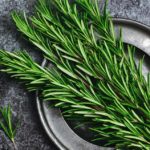 Rosemary is generally safe for both cats and dogs in small amounts. It is recognized today for having powerful antibacterial, antiviral, and antifungal properties. It may even help boost the immune system. Rosemary is widely used today as an antioxidant in many pet foods. As an antioxidant, it acts as a natural preservative to help prevent fats such as omega-3 fatty acids from becoming rancid quickly. Even if you never give your dog or cat any rosemary, s/he is probably getting a small amount in their food, especially if they eat kibble.
Rosemary is generally safe for both cats and dogs in small amounts. It is recognized today for having powerful antibacterial, antiviral, and antifungal properties. It may even help boost the immune system. Rosemary is widely used today as an antioxidant in many pet foods. As an antioxidant, it acts as a natural preservative to help prevent fats such as omega-3 fatty acids from becoming rancid quickly. Even if you never give your dog or cat any rosemary, s/he is probably getting a small amount in their food, especially if they eat kibble.
Use 1/8 to ½ teaspoon, depending on your pet’s size… more
Sage
 Sage has been a popular herb for millennia. It’s been used to treat everything from mental problems to hair care. Today, sage is recognized for having antimicrobial effects that can help kill plaque as well as antibacterial and anti-fungal properties. It also contains a number of important antioxidants and over 160 kinds of polyphenols. It is considered to be safe for pets in small amounts.
Sage has been a popular herb for millennia. It’s been used to treat everything from mental problems to hair care. Today, sage is recognized for having antimicrobial effects that can help kill plaque as well as antibacterial and anti-fungal properties. It also contains a number of important antioxidants and over 160 kinds of polyphenols. It is considered to be safe for pets in small amounts.
Use 1/8 to 1 teaspoon mixed into food, depending on your pet’s size.
Thyme
 Thyme is another ancient herb. It has antimicrobial and antiseptic properties. One of the compounds in thyme – thymol – is an active ingredient in some commercial mouthwashes such as Listerine. Thymol has even been used in some pesticides. In the past, before the use of modern antibiotics, oil of thyme was applied to bandages to help with healing. Thyme also has elements that act as an antibacterial and disinfectant. Thyme is also thought to be a natural preservative of foods against some food-borne bacteria. Thyme is considered safe in small amounts for most pets even though thyme is closely related to oregano.
Thyme is another ancient herb. It has antimicrobial and antiseptic properties. One of the compounds in thyme – thymol – is an active ingredient in some commercial mouthwashes such as Listerine. Thymol has even been used in some pesticides. In the past, before the use of modern antibiotics, oil of thyme was applied to bandages to help with healing. Thyme also has elements that act as an antibacterial and disinfectant. Thyme is also thought to be a natural preservative of foods against some food-borne bacteria. Thyme is considered safe in small amounts for most pets even though thyme is closely related to oregano.
Use ½ to 1 teaspoon every few days, depending on your pet’s size… more
Vanilla
 We usually take vanilla for granted but it is one of the most expensive spices in the world. Vanilla comes from tropical climbing orchids that are very labor-intensive to grow and require hand-pollination. Natural vanilla extract contains hundreds of compounds, including vanillin. It has the potential for many health benefits. The vanillin in vanilla is associated with antioxidant and anti-inflammatory properties, neuroprotection for the brain, and is being studied in anti-cancer research. Vanilla itself is not harmful to cats and dogs. However, vanilla is normally used in many foods and beverages and some of them could be harmful to pets. Avoid giving your pet foods with vanilla that could contain other harmful ingredients such as xylitol, alcohol, or large amounts of sugar.
We usually take vanilla for granted but it is one of the most expensive spices in the world. Vanilla comes from tropical climbing orchids that are very labor-intensive to grow and require hand-pollination. Natural vanilla extract contains hundreds of compounds, including vanillin. It has the potential for many health benefits. The vanillin in vanilla is associated with antioxidant and anti-inflammatory properties, neuroprotection for the brain, and is being studied in anti-cancer research. Vanilla itself is not harmful to cats and dogs. However, vanilla is normally used in many foods and beverages and some of them could be harmful to pets. Avoid giving your pet foods with vanilla that could contain other harmful ingredients such as xylitol, alcohol, or large amounts of sugar.
Amounts depend on the food that contains the vanilla… more
Unfriendly Herbs
Allspice
Allspice is closely related to cloves. It can be unsafe if used in large amounts because, like cloves, it contains high amounts of eugenol compounds. However, it also contains flavonoids and antioxidant compounds which seem to make it beneficial. Technically, it is not toxic to dogs in very small amounts. In larger amounts, it can produce vomiting, diarrhea, and lethargy. It can be toxic to cats. In general, it’s not recommended for dogs because it can be difficult to be sure of the small amount to use safely… more
Cloves
Cloves are not considered safe for pets. Cloves are a spice. In folk medicine they have traditionally been used as an analgesic. Many people swear that clove oil helps with toothache pain. Clove oil is very high in antioxidants, especially eugenol. However, the amount of eugenol that is found in clove oil can be toxic to both humans and to animals. Very, very small amounts of cloves could be safe for dogs but it’s usually not worth the risk. Even a small amount of cloves can be toxic to cats. Warning signs that your pet might be having problems after eating cloves include vomiting, diarrhea, and lethargy… more
Oregano (Cats ONLY)
Oregano contains a number of antioxidants. As part of herbal medicine, it has been used for a vast array of ailments for centuries. Recent research suggests that it may be effective as an antibacterial, anti-inflammatory, for regulating blood sugar and lipids, and even for fighting cancer. Oregano is safe for most dogs in small amounts. However, it is toxic to cats even in very small amounts.
How to Use Herbs
If you are using an herb for your pet, you can generally use it the same way that you would use it in your own food. In most cases, herbs for cats and dogs are only used in very small amounts.
Fresh herbs are normally stronger than dried herbs. They are usually made up of leaves from the plant. You can chop the fresh leaves and add them to your dog’s food.
If you are using dried herbs from a container, very small amounts are used. (See the suggestions provided for each herb.)
Some herbs can be made into teas such as basil, parsley, and peppermint. You can generally pour boiling water over the fresh leaves, allow it to steep for a few minutes, let it cool, and share it with your pet. Not all pets will like these teas. You can put a little in your pet’s food. Dogs can be more willing to try herbal tea added to their kibble than cats but you can try.
Pets and Herbs
Most of us tend to believe that herbs are beneficial. Many of them are helpful. However, it’s important to remember that for ages before modern medicine, people used herbs medicinally. Today many herbs are being researched for their value in fighting diseases. Used indiscriminately, some herbs can be dangerous, especially if your pet has any pre-existing conditions. Please use care when giving your cat or dog any herbs. If your pet has any health issues, talk to your veterinarian before adding any herbs to his or her diet. You can also talk to an herbalist or someone who is licensed in complementary or alternative medicine to assist you in choosing herbs for your pet’s diet.

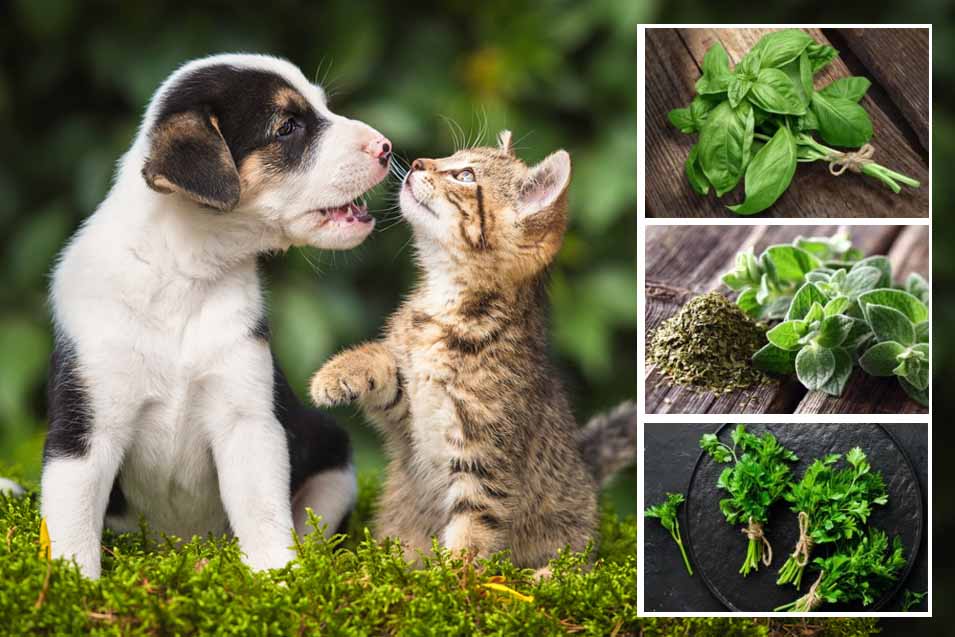



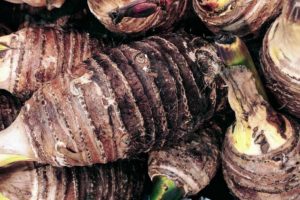

2 Responses
what about Mullein Leaf Extract for cats/felines for respiratory issues?
I will ask our vet when she returns from time off